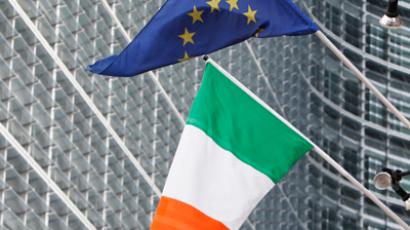Irish govt uses fear to find support for austerity vote - Irish MP
With close to 500,000 unemployed and 250,000 children living in poverty, Ireland is feeling the burden of austerity. Now the traumatized Irish economy is faced with even more cuts.
Richard Boyd Barrett is a member of the Irish parliament and will vote “no” in a referendum on a fiscal pact with the European Union on Thursday, May 31st. The pact would impose further austerity cuts on the already reeling Irish economy.RT: Tell us first what the fiscal pact is?Richard Boyd Barrett: Well, the pact is a European agreement, which countries are being asked to sign up to, which will compel governments to reduce debt and deficit figures by a certain amount per year over a long period of time, and what we’re concerned about is that that, in effect because of all the gambling debts of banks and speculators have been put onto the books of the state, that this will mean permanent austerity, billions worth of cuts every year for at least a decade or more in order to meet the treaty targets. And that, we believe, will do untold damage to the economy which is already very traumatized, and impose even more suffering on working people, on the less well-off, and on the vulnerable in our society who have already been devastated by four years of austerity.RT: And talk to me more about that. What’s the socio-economic background against which this referendum is being held?RBB: Well, in Ireland now we have 450,000 people unemployed, we’ve had 200,000 people leave the country because there’s no work. We’ve got approximately 3 quarters of a million people living in poverty, about a quarter of a million children living in poverty, literally going to bed hungry at night. We have public services that have been utterly devastated by austerity cuts imposed by the EU IMF over the last four years, so really people cannot take much more pain, and equally, this has not done anything to help the economy recover. The economy has tipped back into recession, and I think if you look at the rest of Europe, I think it’s clear that the austerity policies have also driven the wider Euro zone into recession, so we think we have to call a halt to this policy which is simply not working and which is doing extreme damage, if you like, to the social and economic fabric of Europe. RT: And what’s the atmosphere like here? We hear from the Greeks that this constant pushing for more and more austerity from the government is creating an atmosphere of fear in the country. Is it the same here?RBB: Yes, I think the government’s main weapon in trying to get people to vote” yes” has been fear, threats that money won’t come out of the ATM’s, that there’ll be no money to pay pensions and social welfare. So there’s no positive reasons being given, it’s just “we’ve got to take this austerity, otherwise there will be disaster”, and in fact, we think the disaster is happening already. It’s clear Greece have been, if you like, the major victims of austerity, and now they’re proposing to generalize that austerity model right across Europe, and if didn’t work in Greece, what makes them think it’s going to work in the rest of Europe?RT: How financially integrated is Ireland into Europe? We’re talking bank loans and bailouts, that kind of thing.RBB: Oh, we’re very deeply intertwined. Europe are our biggest trading partners, so there’s no doubt that our fate is linked to the wider European economy, but I think there’s a battle going on in Europe as to whether we follow the Merkel-Sarkozy model of austerity and bailing out banks, or whether we go in a different direction where we prioritize employment, protection of public services, and economic growth, and we’re certainly for the latter. RT: You seem so sure that the EU won’t cut off funding to Ireland even if the vote does go against measures proposed by Brussels. What makes you so sure? RBB: Well, I think there’s an implication that Europe bails countries out, and in fact what they’re doing is they’re bailing out the European financial system. That’s the reason they’re providing assistance. And if they perceive a threat to the European banks, to German, French, and British banks, they will provide funding, because otherwise the entire Euro zone will collapse. So we think it’s a bogus threat to suggest that if we vote no, they’re going to cut off funding, because they would be cutting off their nose to spite their face. RT: Almost every major political party in Ireland is in the “yes” camp, and this treaty’s already been ratified by all but two European countries. Can so many political and economic minds be wrong?RBB: Well, that’s not strictly true. Governments have signed up, have agreed to ratify the treaty, but in fact many of those governments are now finding themselves unable to actually get the treaty through their parliaments. The Dutch government have been unable to get it through their parliament. Francois Hollande is delaying the ratification, precisely because he believes on its own it will do more damage to the French economy, and now Angela Merkel cannot even get the fiscal treaty, which she wrote, effectively through the German parliament, because the German opposition are saying it will mean more cuts and do damage to the German economy. So I think there’s a real question mark over whether this treaty can be pushed through, and we want to add our weight to the forces in Europe that are saying more austerity won’t work, and that we need a different approach.RT: The yes camp says that if the fiscal pact isn’t ratified, Irish people would be subject to harsher austerity for longer, it would be more expensive to borrow money on the international markets, and there would be no more EU bailouts. Surely all of those are situations that you would want to avoid?RBB: First of all, it would be difficult for the austerity to be any worse than it has been over the last four years. We’ve had 24 billion Euros sucked out of the Irish economy with devastating consequences, and the fiscal treaty would require us to take more or less the same amount over the next number of years, which could only have the effect of more unemployment, more economic stagnation, more suffering for people. So we believe there is an alternative to that, and that that is to focus instead on investment, jobs, and growth rather than the continuous policy of bailing out the bond-holders and the banks that caused the crisis in the first place.RT: What about this idea of sovereignty? It seems that some of what is at stake here is this kind of emotional feeling of nationhood? Can Ireland afford to have that kind of pride at the moment? RBB: Well, I’d like to put it more in terms of democracy not just for Ireland but in for Europe as a whole, and what the fiscal treaty will do, is it will centralize more power over economic policy into the hands of the unelected European Union Commission, and the European Central Bank, and the European Court of Justice, when really it should be democratically elected representatives, both at a national level and at a European level who should dictate policy as the people decide. So we don’t think we should tie ourselves into a treaty that will essentially enforce a particular economic policy or dogma on people in perpetuity. RT: How far is Ireland from a Greek situation? RBB: I think if we continue down the road of austerity, we’re about a year behind Greece in terms of the devastation that is likely to be caused to the economy and our society, so we think it is very very urgent that we call a halt to that and demand that both our government and European leaders end the policy of bailing out banks and paying for it with brutal austerity being imposed on the people, when that is doing such obvious and serious damage to the economy and its prospects for recovery.














